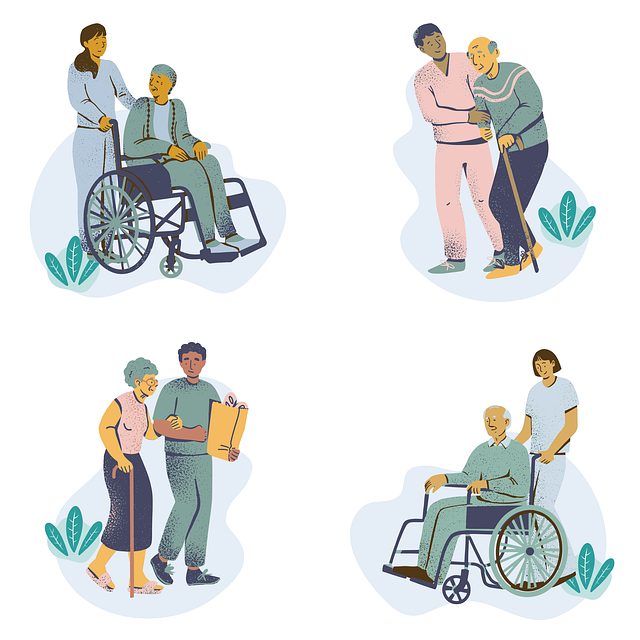In Illinois, elderly sexual assault cases require specialized handling due to unique challenges posed by age-related issues. Probation and parole play crucial roles in managing these cases, with probation offering supervised release and parole providing conditional freedom before full sentences are served. Elderly sexual assault lawyers IL are essential navigators of these complex systems, advising clients on tailored conditions, advocating for alternative sentencing, and ensuring victim safety. These specialists consider age-related limitations, exploring compassionate solutions like in-home monitoring or community programs. Parole officers closely monitor offenders' rehabilitation while balancing public safety, often involving nuanced evaluations of crime severity, incarcerated conduct, and reintegration plans. Lawyers emphasize mental health services, community support, housing stability, and financial assistance to facilitate successful reintegration, reduce recidivism, and promote long-term rehabilitation for elderly offenders.
In Illinois, probation and parole play a critical role in managing elderly sexual assault offenders. This comprehensive guide explores the intricate systems of probation and parole within the state’s framework, focusing specifically on cases involving older defendants. We delve into the unique challenges faced by elderly offenders during probation, scrutinize the parole process for sexual assault crimes, and highlight best practices for post-release support. Key insights from elderly sexual assault lawyers in IL provide a crucial perspective for navigating these complex systems effectively.
Understanding Probation and Parole in Illinois: A Framework for Elderly Sexual Assault Cases

In Illinois, probation and parole play a significant role in managing cases involving elderly sexual assault offenders. These legal mechanisms offer a structured approach to oversee and rehabilitate individuals convicted of such crimes against vulnerable elders. Probation allows for supervised release, enabling courts to impose specific conditions tailored to protect potential victims and ensure the offender’s compliance with legal requirements. Elderly sexual assault lawyers in IL often navigate these complexities, advising clients on the terms of probation, which may include regular check-ins, participation in therapy or support groups, and restrictions on certain activities or locations.
Parole, on the other hand, involves a conditional release from prison before the full sentence is served, requiring ongoing monitoring and adherence to specific guidelines. Parole officers in Illinois work closely with elderly sexual assault offenders, providing guidance and support while assessing their progress and risk level. By combining probation and parole strategies, the state aims to balance public safety with efforts to rehabilitate offenders, addressing the unique challenges posed by cases involving vulnerable elders.
The Role of Elderly Sexual Assault Lawyers in Navigating these Systems

Elderly sexual assault lawyers in Illinois play a pivotal role in navigating complex systems designed to manage and rehabilitate offenders. These legal experts are crucial in ensuring that the rights of elderly victims are protected while also advocating for fair treatment and appropriate sentencing for the perpetrators. With their deep understanding of state laws and regulations related to probation and parole, these specialists guide clients through every step, from initial charging to post-sentence monitoring.
They help elderly sexual assault offenders navigate a labyrinthine system that often includes extensive paperwork, strict conditions, and regular check-ins. By leveraging their knowledge and connections, they can secure the best possible outcomes for their clients, including alternative sentencing options, specialized support services, and reduced restrictions that promote reintegration into society while prioritizing victim safety.
Probationary Requirements and Challenges for Elderly Offenders

Probation for elderly sexual assault offenders in Illinois comes with unique considerations and challenges due to their age and potential cognitive or physical limitations. These individuals often require specialized support services, such as mental health counseling, memory care, or assistance with daily living tasks, which can be integral parts of their probation conditions. Elderly offenders might face difficulties adhering to standard probation requirements like regular check-ins with officers or attending group sessions, requiring tailored and compassionate approaches from probation officials.
Elderly sexual assault cases necessitate a nuanced understanding of the offender’s capabilities and vulnerabilities. Illinois elderly sexual assault lawyers often advocate for clients facing these challenges, ensuring their rights are protected while exploring alternative solutions. This may include recommendations for in-home monitoring, community-based programs, or adjustments to probation schedules, allowing for more flexibility and support during this critical period of rehabilitation and reintegration into society.
Parole Process and Considerations for Sexual Assault Crimes

In Illinois, the parole process for sexual assault offenders involves a meticulous evaluation of their rehabilitation and potential risk to public safety. Elderly offenders, in particular, present unique considerations due to age-related factors that can impact their behavior and decision-making processes. Parole boards carefully review each case, examining the nature and severity of the crime, the offender’s conduct while incarcerated, participation in therapy or treatment programs, and any plans for reintegration into society. A strong support system, including access to specialized elderly sexual assault lawyers IL, can be crucial in navigating this complex process.
When assessing parole applications, boards must balance the desire to rehabilitate offenders with the need to protect vulnerable populations. Elderly sexual assault cases often require sensitive handling, as victims may have specific needs and concerns related to age-related vulnerabilities. Adequate counseling, community supervision, and monitoring strategies are implemented to ensure a reduced risk of reoffending while considering the unique challenges faced by elderly offenders in reintegrating into society.
Best Practices for Managing and Supporting Elderly Offenders Post-Release

Upon release from prison, managing and supporting elderly sexual assault offenders requires a tailored approach to address their unique needs and challenges. Best practices involve providing access to specialized mental health services to help them cope with trauma and any co-occurring disorders. These services should be easily accessible and tailored to their age group, ensuring they feel comfortable discussing sensitive topics. Additionally, establishing robust support networks is vital; this includes connecting offenders with community-based organizations specializing in elderly care and rehabilitation.
Elderly sexual assault lawyers in IL often emphasize the importance of housing stability and financial assistance programs to help offenders reintegrate into society. These measures ensure they have safe and suitable accommodations and access to essential resources, reducing the risk of recidivism. Encouraging participation in social activities and volunteer work can also foster a sense of purpose and community involvement, contributing to successful reintegration and long-term rehabilitation.






